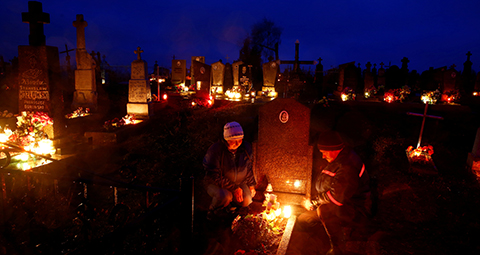BY James Farrell | November 2 | ![]() 0 COMMENTS
0 COMMENTS ![]() print
print

Welcoming a season of remembrance
Accompanying families through the dark days of grief is anything but depressing, it is an inspiration, Fr Michael Kane writes.
Catholics live by seasons. In the past week, the Church has transitioned from Our Lady’s month of October to November, the month of the Holy Souls.
This change signals a shift in tone and focus. Masses in our parishes will now be offered each day for all those who have died, especially our family members and friends. Such a remembrance is noble in itself, ‘lest we forget’ those who have shaped our lives today. “The memory of a good person is indeed a blessing,” says Proverbs.
Yet for very many in our parishes, the memory of loss is often difficult, still extremely raw, with wounds of grief yet to heal. Remembrance often conjures up not only the happy memory of those we’ve lost, but also the painful experience of the funeral itself.
For a priest, of course, celebrating funerals and burying the dead is a solemn and sacred duty which we are asked to discharge with care and gentleness. No matter how often we preside at Requiem Masses we see how deeply personal human grief is.
There is no ‘one size fits all’ when it comes to grief. CS Lewis once wrote in A Grief Observed that ‘the death of a loved one is like an amputation.’ This is the experience of a great many; it is as painful as it is prolonged, and leaves us deeply wounded and scarred.
Grief also unleashes confusion, doubt, fear, regrets, despair and all manner of conflicting emotions, sometimes at once, sometimes gradually. It is a deeply personal journey which priests are invited to walk with families and individuals.
Very often, when a person dies, it is the priest’s presence and silent prayers which are most needed. It is a fallacy to believe that our ‘wise words’ will soothe the soreness away at that moment. Our words, no matter how eloquent, do not contain such power; they cannot simply explain every question away. In such moments, I have found that silence can prove the most loyal friend to a priest. These are moments to pray together, not to justify or explain away.
I remember speaking to a non-believer recently about my work as a priest. He was intrigued by some of my unusual duties. He asked if it wasn’t altogether depressing being surrounded by grief and death on a daily basis.
His was an interesting perspective from someone who saw only the human dimension of life and death. The truth is that such moments are, in my experience, profoundly spiritual.
The Catholic funeral liturgy is especially transformative for many people. So often I have heard people say to me: “Father, nothing beats a Catholic funeral!” And it seems so strange that the term ‘amazing funeral’ appears in the vocabulary of most Catholics. What can possibly be so ‘amazing’ about a funeral?
But I think it’s true. Proclaiming the power of Christ in the midst of raw grief is transformative. I’ve seen first hand how God can lead people in the Mass from the darkness of grief to a different place.
That’s not to say that heartache is immediately healed. Rather, grief can now be seen in the light of the Lord’s promise. We don’t deny the reality of death, the permanence of separation in this world, nor the depth of our human suffering. But the funeral liturgy asks us to be trusting, to be patient, to be disciples of hope.
Preparing and celebrating a funeral Mass can be a challenging task. It’s not principally an opportunity to eulogise about human achievements, nor an invitation to canonise a fellow Christian. Our liturgy is a confident proclamation of the risen Jesus.
The Funeral Mass, for all it has been dressed-up as a celebration of human life, is nothing more than a heartfelt appeal from us to God. In this appeal we pray that His fount of mercy will blot-out the sins of human weakness and restore the dead to unending life.
In answer to my non-believing friend, I treasure those grace-filled moments when accompanying families through grief and sadness. They’re not depressing in the least. When I see the depths of Faith and hope and trust, these are moments that inspire me.
I end with a few verses from one of my favourite ‘November hymns.’ It speaks well about our obligations to those whom we have loved and lost. I, for one, will be singing these words with full Faith during this month of the Holy Souls:
“They are waiting for our petitions silent and calm,
Their lips no prayer can utter, no suppliant psalm,
We have made them all too weary with long delay,
For the souls in their still agony, good Christian pray.
Requiescant in pace, requiescant in Pace.
“For the soul thou holdest dearest let prayers arise,
The voice of love is mighty and will pierce the skies.
Waste not in selfish weeping one precious day,
But speeding thy love to Heaven, good Christian pray.
Requiescant in pace, requiescant in Pace.”










